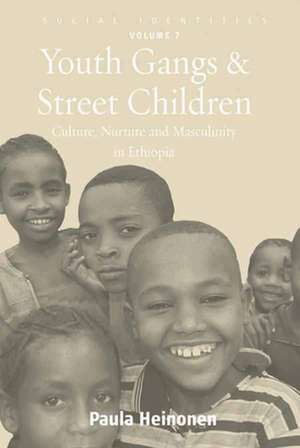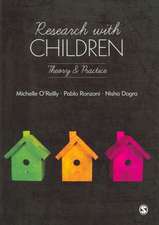Youth Gangs and Street Children: Social Identities, cartea 7
Autor Paula Heinonenen Limba Engleză Paperback – 31 mai 2013
Paula Heinonen (née Sinicco) is of Ethiopian/Italian parentage and grew up in Addis Ababa. She is College Lecturer in Gender Studies and the Anthropology of Development at Hertford, University of Oxford. Previously, she was Tutor and Visiting Fellows Program Coordinator at the International Gender Studies Centre, University of Oxford and Senior Lecturer in Anthropology and Head of Research at the University of Addis Ababa, Ethiopia.
| Toate formatele și edițiile | Preț | Express |
|---|---|---|
| Paperback (1) | 220.52 lei 43-57 zile | |
| BERGHAHN BOOKS INC – 31 mai 2013 | 220.52 lei 43-57 zile | |
| Hardback (1) | 746.21 lei 43-57 zile | |
| BERGHAHN BOOKS INC – 5 iul 2011 | 746.21 lei 43-57 zile |
Preț: 220.52 lei
Nou
Puncte Express: 331
Preț estimativ în valută:
42.20€ • 44.17$ • 35.12£
42.20€ • 44.17$ • 35.12£
Carte tipărită la comandă
Livrare economică 31 martie-14 aprilie
Preluare comenzi: 021 569.72.76
Specificații
ISBN-13: 9781782381327
ISBN-10: 1782381325
Pagini: 180
Dimensiuni: 152 x 229 x 10 mm
Greutate: 0.25 kg
Editura: BERGHAHN BOOKS INC
Seria Social Identities
ISBN-10: 1782381325
Pagini: 180
Dimensiuni: 152 x 229 x 10 mm
Greutate: 0.25 kg
Editura: BERGHAHN BOOKS INC
Seria Social Identities
Notă biografică
Paula Heinonen (nee Sinicco) is of Ethiopian/Italian parentage and grew up in Addis Ababa. She was Senior Lecturer in Anthropology and Head of Research at the Centre for Training and Research on Women in Development, University of Addis Ababa, from 1996 to 2001. She is currently Tutor and Visiting Fellows Program Coordinator at the International Gender Studies Centre, University of Oxford.
Cuprins
Acknowledgements Introduction Poverty and Streetism in Ethiopia Methodology Culture The book Chapter 1. Ethiopia The Country Ethnicity Consequences of famines in Ethiopia Addis Ababa Housing Street People and Others Chapter 2. Yilunta: Shame, Honour and Family pride Masculinity Yilunta Socialization Parenting among the Poor Children's role in Parenting their Siblings and Parents. Chapter 3. Son of a Woman Mulu's Story Lemlem's Story The Economics of Street life Home Life Social Networks Motherhood Fatherhood Playtime Education Health Parenting the Parents The Next Generation Chapter 4. Borco: The Give and Take of Gang Membership The Borcos and their kind Territory Group formation Gang Life Street Work Sharing Friendship and Cooperating Unrequited Love Unrequited Reciprocity 'Imediatismo' Health and Death Crime Violence Maturing out of the street Chapter 5. Girls, Sex, and Gang Life No Home to go to Not Homeless but Jobless: The Bozene Girls, Sex, and Gang life Slow Descent into Hell Discussion and Conclusion Bibliography
Recenzii
"The author's relatively long period of field work enables her to follow-up on the longer term fates of the informants. Heinonen has taken great care to gather and categorise her data and to distil it down to its essence. [It] provides a great deal of insight into the complicated ways in which urban poverty is perpetuated in the developing world - [and] serves as an abundant source for those interested in gender, especially for understanding the real-life strategies employed by Ethiopian women and children to survive in a predominantly patriarchal society, and especially for following the way maleness is constructed." * Anthropological Notebooks "Richly illustrated by quotes and life histories, this is an excellent ethnography of the ways in which young people develop resilience through continual reworking of webs of care, nurturance and interaction amongst themselves and with their families - The text is well written, comprehensive and based on a rich source of empirical material that is well analyzed and interpreted." * Tatek Abebe, Norwegian Centre for Child Research, Norwegian University of Sciences and Technology, Trondheim "The book is a unique study based on long - term detailed field research. The author adopts the novel approach of analyzing gender and masculinity from the perspective of children and their families and how they experience it, and in the process offers a searing and unsparing gaze on the plight of families and children living in difficult circumstances. Dr. Heinonen's findings have profound implications, not just for policy makers and NGOs but for our very conception of 'street children' and 'youth gangs'. It is a major contribution to African ethnography and gender studies." * Marieme S. Lo, PhD, University of Toronto





















